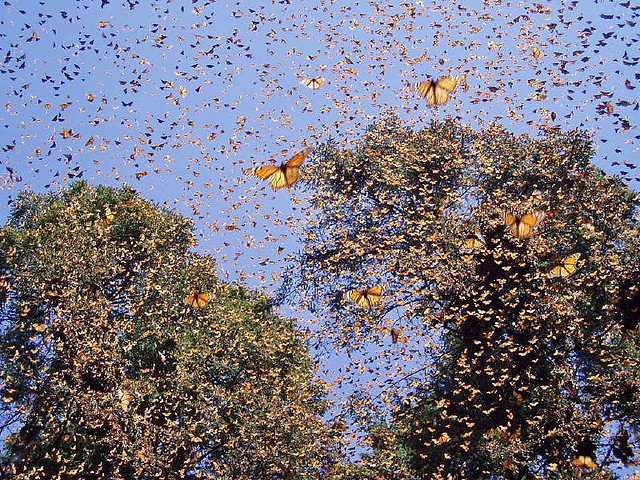Earlier this month I came across a discouraging Slate article about how habitat destruction is threatening the monarch butterfly. I can recommend a very good novel about dwindling monarch populations if this is a subject that interests you.
First of all, here’s Slate’s explanation:
The long-term loss of habitat has been due to the adoption of herbicide-tolerant crops. As herbicide-tolerant crops really began to increase in about the year 2000, then we began to see an impact on the population. The reason for that is monarchs are dependent on milkweeds, and it turned out that milkweeds were actually growing in corn and soybean fields, in modest numbers — not enough to cause crop damage or interfere with crop production. Monarchs are totally dependent on milkweeds to reproduce; without milkweeds there are no monarchs. So as these herbicide-tolerant plants were adopted more and more, we saw progressive elimination of milkweeds in the field crops. I should mention that the reason the milkweeds still persisted in the field crops was that prior to the year 2000 most of the weeds were controlled by tillage. Milkweeds survived that better than most weeds did, and that’s why they still persisted in those fields despite the fact there was weed control. But once we had the herbicide-tolerant plants coming into the system we lost the milkweeds.
Barbara Kingsolver’s Flight Behavior (2012) describes what happens when millions of monarchs suddenly appear on a mountaintop in southern Appalachia. The main character is a sheep farmer’s wife, Dellarobia, who feels stuck in a rut, and the monarchs open up new possibilities for her.
As one who was raised in the Appalachians (albeit in a more privileged environment than Dellarobia’s), I can vouch for the accuracy of Kingsolver’s descriptions. She gives us characters who want to make a buck from irresponsibly logging the mountainsides, even though such logging could lead to the same kinds of mud slides that displaced the monarchs from their Central American home, and characters who are so struck by the beauty of the butterflies that they unexpectedly become environmentalists. But even as Kingsolver finds hope for the environmental movement in unexpected places and even as she rakes over the media for its unwillingness to fully acknowledge global warming, she also satirizes professional environmental activists, noting that some fail to acknowledge the needs and sensibilities of the lower middle class.
Like many of Kingsolver’s novels, Flight Behavior is a story that uses an engaging, tough-talking woman to raise environmental awareness. Here’s a passage that describes Dellarobia’s first encounter with the insects. She is climbing a mountain on her way to an adulterous rendezvous that will probably ruin her family. She’s not sure what she is seeing because she has forgotten her glasses, but the seemingly miraculous vision sets her on a healthier track:
A small shift between cloud and sun altered the daylight, and the whole landscape intensified, brightening before her eyes. The forest blazed with its own internal flame. “Jesus,” she said, not calling for help, she and Jesus weren’t that close, but putting her voice in the world because nothing else present made sense. The sun slipped out by another degree, passing its warmth across the land, and the mountain seemed to explode with light. Brightness of a new intensity moved up the valley in a rippling wave, like the disturbed surface of a lake. Every bough glowed with an orange blaze. “Jesus God,” she said again. No words came to her that seemed sane. Trees turned to fire, a burning bush. Moses came to mind, and Ezekiel, words from Scripture that occupied a certain space in her brain but no longer carried honest weight, if they ever had. Burning coals of fire went up and down among the living creatures.
The flame now appeared to lift from individual treetops in showers of orange sparks, exploding the way a pine log does in a campfire when it’s poked. The sparks spiraled upward in swirls like funnel clouds. Twisters of brightness against gray sky. In broad daylight with no comprehension, she watched. From the tops of the funnels the sparks lifted high and sailed out undirected above the dark forest.
So much beauty threatened by our never ending assault on the earth.


